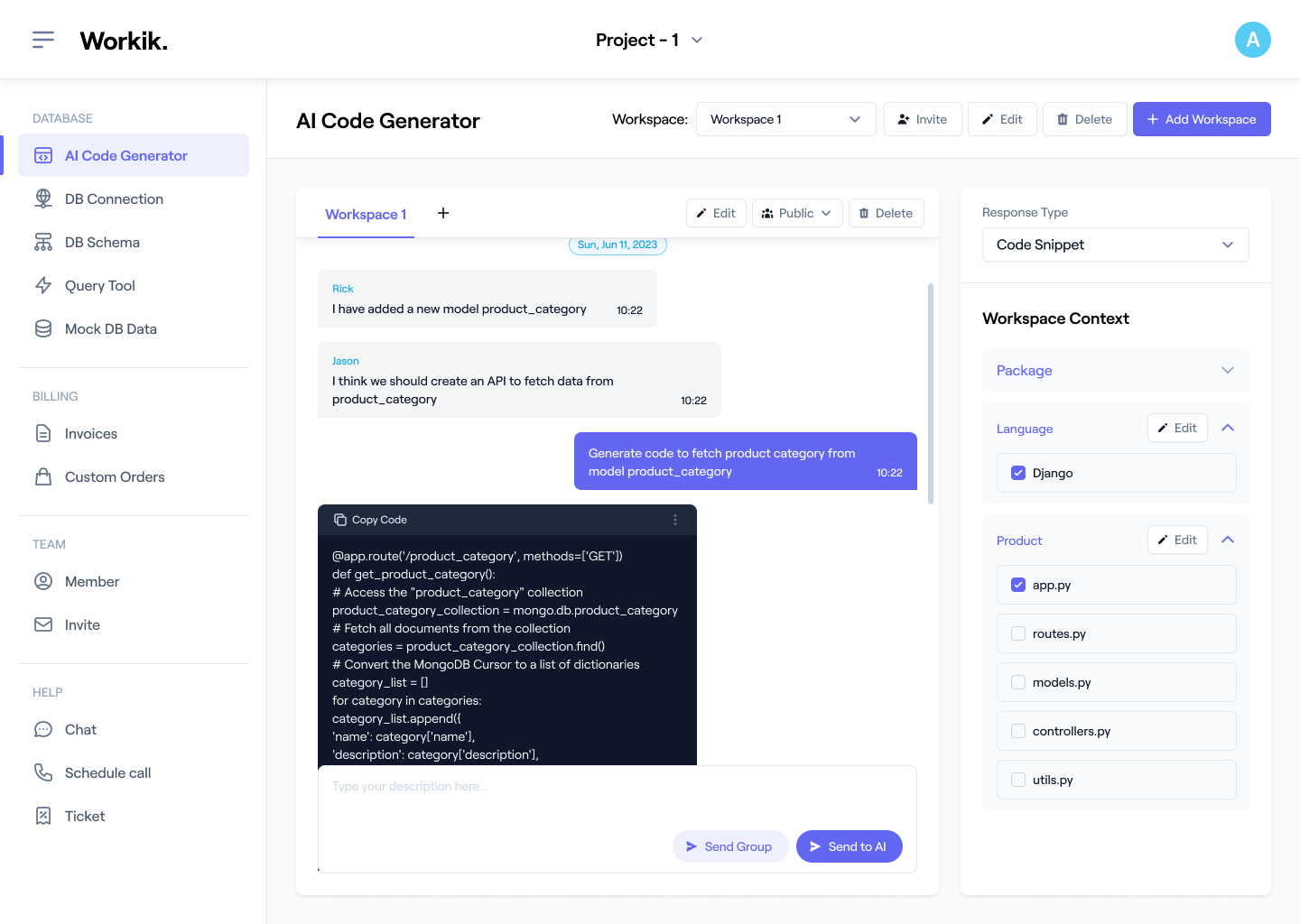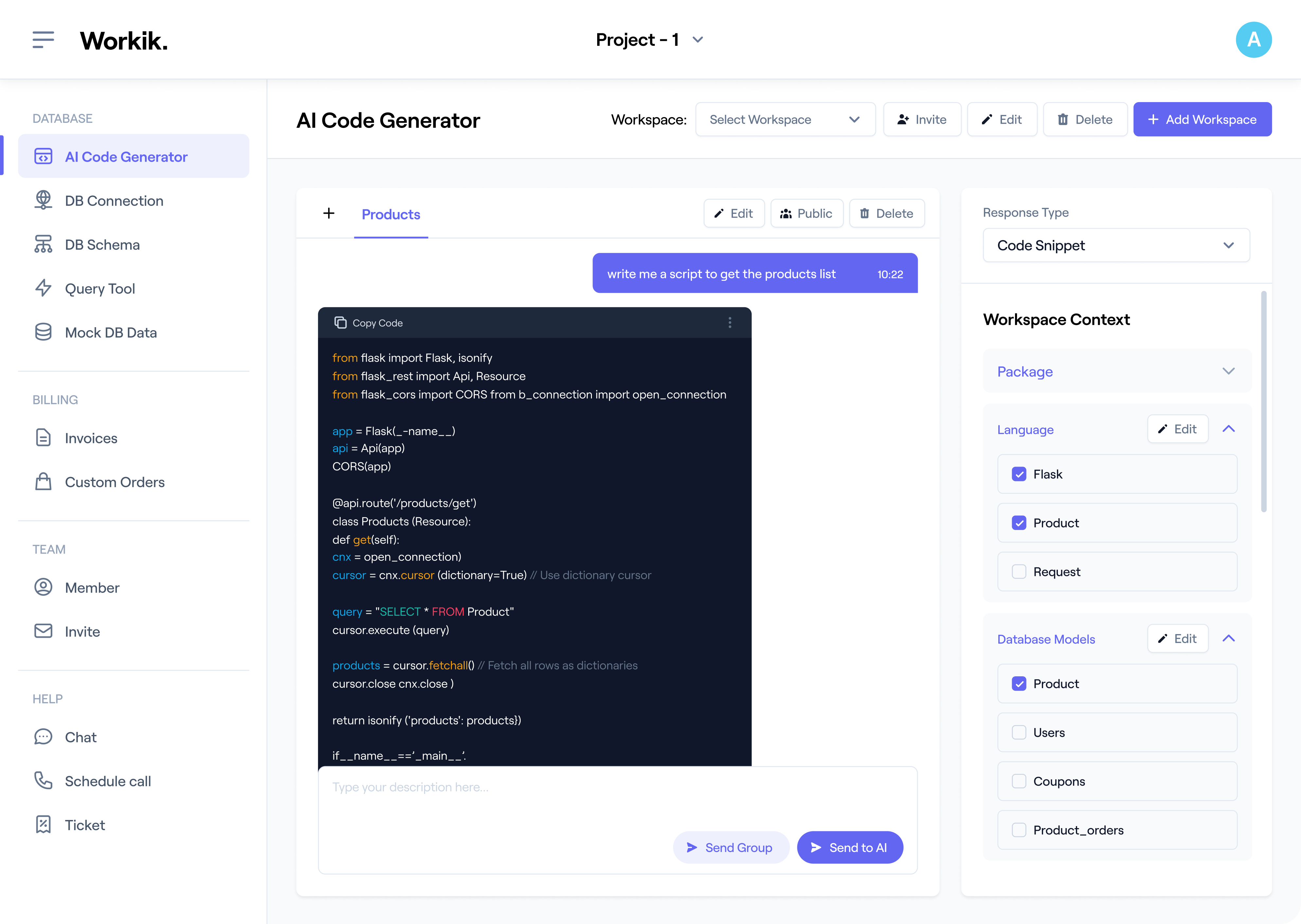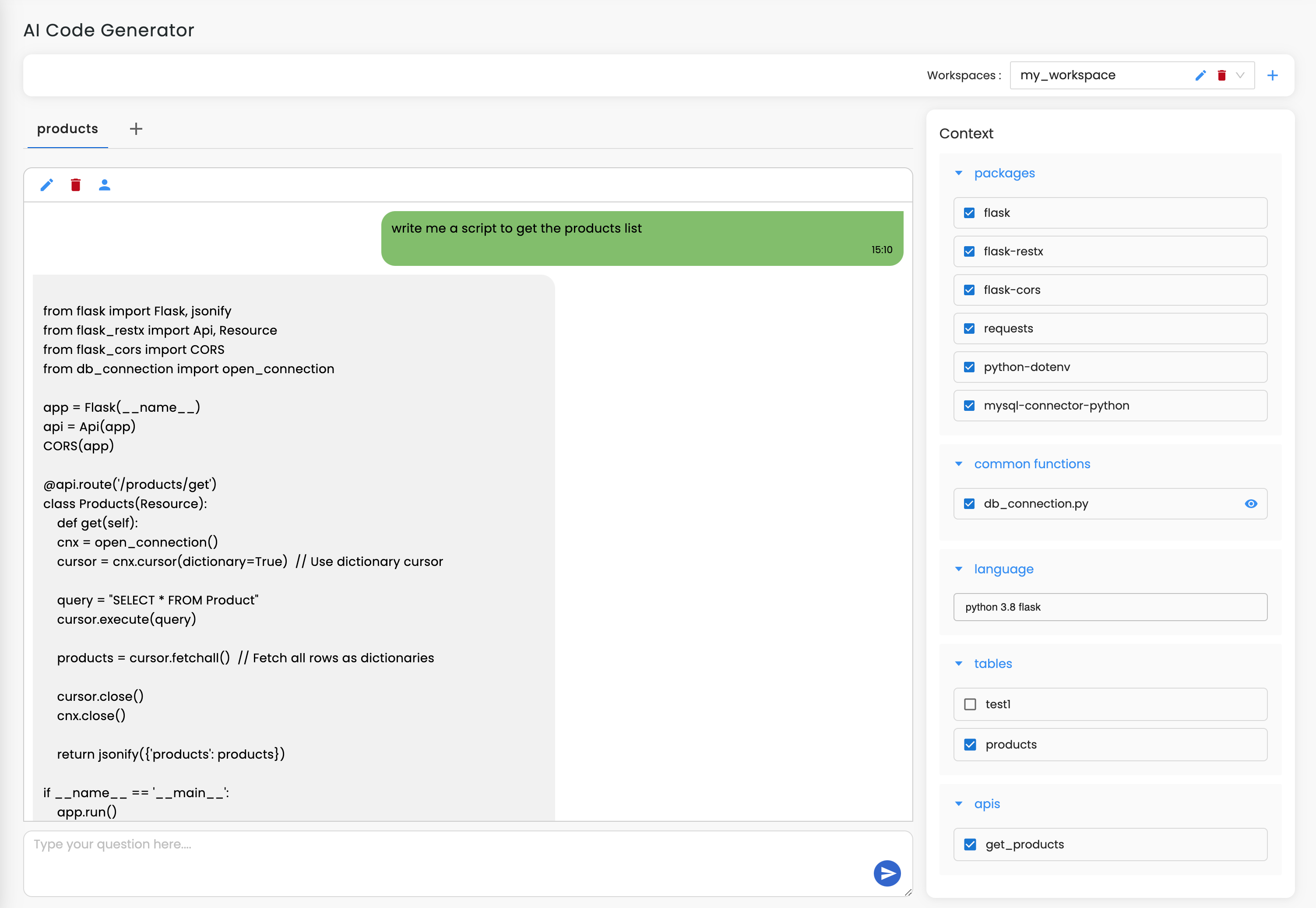
Join our community to see how developers are using Workik AI everyday.
Features

Generate Contextual Names
AI suggests descriptive variable names based on frameworks, libraries, and databases, improving readability.

Handle Multi-Language Projects
AI tailors variable names for each language, ensuring consistency across frontend (JavaScript) and backend (Python).

Ensure Naming Consistency
AI adapts naming to fit tailored conventions (e.g., snake_case for Python, camelCase for Java).

Refactor Names Effortlessly
AI detects unclear names and provides meaningful alternatives with ESLint for clean code.
How it works
Quickly register via Google or manually to access Workik’s AI Variable Name Generator.
Connect your codebase to Workik. The AI analyzes your project’s structure, libraries, and schema to generate context-aware variable names.
Generate meaningful, readable variable names based on your coding conventions and project needs. The AI adapts to your frameworks and style.
Invite your team to review or modify the AI’s suggestions. Use real-time collaboration to ensure consistency across your codebase.


Expand
.png)
.png)
Expand


Expand


Expand


Expand


Expand


Expand


TESTIMONIALS
Real Stories, Real Results with Workik
Workik AI cleaned up our naming conventions across GitLab, speeding up code reviews.

John Martinez
DevOps Engineer
As a junior, it helped me grasp best practices by generating clear, industry-standard variable names.

Sophie Patel
Junior Developer
Workik AI nailed our naming conventions. It saved me hours of refactoring!

Emma Smith
Senior Software Developer
What are the most popular use cases of Workik AI Variable Name Generator for developers?


Workik’s AI Variable Name Generator supports a wide range of use cases, including but not limited to:
* Generate context-aware variable names, e.g.,
totalCartAmount
instead of
var1
, based on project context.
* Refactor legacy code by replacing unclear names like
x1
with more descriptive ones like
userLoginStatus
.
* Ensure consistent naming conventions in team projects, reducing review errors.
* Suggest language-specific patterns like Python's
snake_case
or JavaScript's
camelCase
.
* Help junior developers adopt naming standards, boosting code quality and learning speed.
How does Workik’s context-setting feature enhance the AI Variable Name Generator?


Workik offers various context-setting options for its AI-powered variable name generator, such as:
* Specify languages to generate naming conventions tailored to each programming language.
* Customize variable names based on libraries or frameworks for improved consistency.
* Upload database schema details, allowing the AI to suggest contextually appropriate names.
* Integrate API blueprints from Postman or Swagger to generate variable names that align with specific endpoint usage.
* Sync with version control systems like GitHub, GitLab, or Bitbucket to provide variable suggestions based on your existing codebase.
How does Workik AI help with debugging variable names?


Workik AI scans the codebase for unclear or unused variables and suggests replacements to keep the code clean. It refactors outdated names, transforming tmp into temporaryUserData , ensuring alignment with current standards.
How does Workik AI assist in code migration with regard to variable names?


Workik AI refactors variable names to match new language conventions, such as converting camelCase to snake_case when migrating from JavaScript to Python. It ensures names align with the target framework’s style and flags variables that may conflict with reserved keywords.
How does Workik AI handle variable naming in large datasets?


Workik AI can generate context-aware variable names for columns and fields in large datasets, such as renaming col1 to customerPurchaseDate based on usage patterns and relationships, improving code comprehension and debugging efficiency.
Can Workik AI enhance variable naming for dynamic programming?


Yes, Workik AI generates context-aware variable names even in dynamically generated code, such as adapting names for loop variables or dynamic keys in JSON objects, ensuring clarity in complex scenarios.
Can Workik AI suggest domain-specific variable names?


Yes, Workik AI analyzes domain-specific contexts, such as e-commerce or healthcare, to generate meaningful variable names. For example, it can suggest productInventoryCount for a retail application or patientVitalsLog for a healthcare platform.
Generate Code For Free

Variable Name: Question and Answer
A variable name is a user-defined identifier in programming that represents a memory location used to store data. It allows developers to reference, retrieve, and modify values dynamically throughout the program. Variable names must follow language-specific naming rules and conventions to ensure readability and functionality.
Popular languages and frameworks that benefit include:
Languages: JavaScript, Python, Ruby, PHP, Java, C#, Swift
Frameworks: React, Angular, Django, Laravel, Ruby on Rails, Flask
Integrated Development Environments (IDEs): Visual Studio Code, PyCharm, IntelliJ IDEA
Version Control Systems: GitHub, GitLab, Bitbucket
Popular use cases of an AI Variable Name Generator include:
* Generate descriptive and standardized variable names across large projects.
* Refactor legacy code with inconsistent or unclear variable names to improve maintainability.
* Assist beginner developers in adhering to industry-standard naming conventions.
* Reduce ambiguity in code by suggesting variable names based on code functions and logic.
* Improve collaboration within teams by enforcing consistent naming patterns across all code contributors.
* Speed up code reviews by providing clarity and reducing misunderstandings caused by vague variable names.
Career opportunities and technical roles that can benefit from using an AI Variable Name Generator include Frontend Developer, Backend Developer, Full Stack Developer, DevOps Engineer, Code Reviewer, Software Architect, Quality Assurance Engineer, Mobile Developer, Data Scientist and more.
Workik AI offers powerful assistance in the realm of variable name generation:
Contextual Suggestions:
Generates meaningful variable names based on function, context, and coding patterns.
Language Optimization:
Adapts names to match conventions in Python, JavaScript, PHP, and more.
Legacy Refactoring:
Suggests clear, updated names to improve readability in existing codebases.
Team Standardization:
Ensures consistent naming conventions across multiple developers.
Error Reduction:
Prevents issues caused by ambiguous or repetitive variable names.
Real-Time Collaboration:
Enables teams to refine variable names collaboratively in shared environments.
Automated Naming:
Automates variable naming, reducing effort and ensuring consistency.
Explore more on Workik
Get in touch
Don't miss any updates of our product.
© Workik Inc. 2026 All rights reserved.

